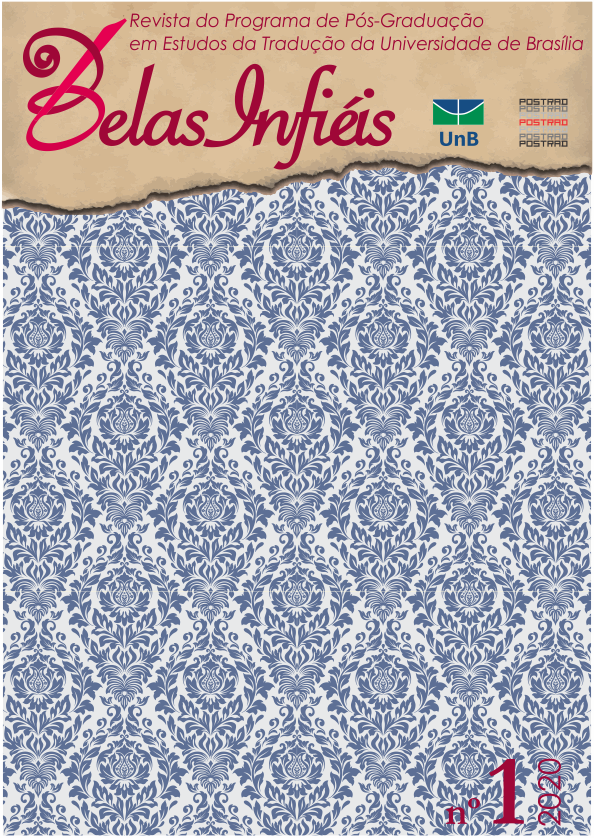Adaptação interlingual de fábula em análise: proposta metodológica e estudo de caso
DOI:
https://doi.org/10.26512/belasinfieis.v9.n1.2020.23347Palabras clave:
Literatura infantil. Paratextos editoriais. Tradução interlingual. Adaptação interlingual. Fábula.Resumen
-
Descargas
Citas
BASTIN, Georges L. Adaptation. In: BAKER, Mona; SALDANHA, Gabriela (org.). Routledge Encyclopedia of Translation Studies. 2. ed. London/New York: Routledge, 2009 [1997]. p. 3-6.
EVEN-ZOHAR, Itamar. The Position of Translated Literature within the Literary Polysystem. In: HOLMES, James; LAMBERT, José; e VAN DEN BROECK, Raymond (org.). Literature and Translation: New Perspectives in Literary Studies. Leuven: Acco, 1978. p. 117-127.
GANCHO, Cândida Vilares. Como analisar narrativas. São Paulo: 2002.
GENETTE, Gérard. Paratextos editoriais. Traduzido por: Álvaro Faleiros. São Paulo: Ateliê, 2009. Tradução de: Seuils [1987].
IRIARTE, Tomás de. Fábulas: O asno flautista. Traduzido por: desconhecido. Belo Horizonte: Villa Rica, [s.d.]. (Coleção Fábulas do Mundo Todo, vol. 16).
LAMBERT, José; VAN GORP, Hendrik. Sobre a descrição de traduções. Traduzido por: Marie-Hélène Catherine Torres e Lincoln Paulo Fernandes. In: GUERINI, Andrea; TORRES, Marie-Hélène Catherine e COSTA, Walter Carlos (org.). Literatura e tradução: textos selecionados de José Lambert. Rio de Janeiro: 7Letras, 2011. p. 208-223. Tradução de: On describing translations [1985].
MOISÉS, Massaud. Dicionário de termos literários. 12. ed. rev. e ampl. São Paulo: Cultrix, 2004.
QUILIS, Antonio. Métrica española. Madrid: Alcalá, 1975.
ROSAS, Clarissa. As fábulas de Tomás de Iriarte ao longo do tempo: um estudo descritivo de retextualizações em português e espanhol. Orientadora: Cintrão, H. 2017. 277 f. Dissertação (Mestrado em Estudos da Tradução) ”“ Faculdade de Filosofia, Letras e Ciências Humanas, USP, São Paulo, 2017. Disponível em: http://www.teses.usp.br/teses/disponiveis/8/8160/tde-09082018-143111/pt-br.php. Acesso em: set. 2019.
ROSAS, Clarissa. Tradução e adaptação na literatura infantojuvenil: o gênero fábula. Revista de Estudos Universitários - REU, v. 42, n. 1, p. 175-197, ago. 2016. Disponível em: http://periodicos.uniso.br/ojs/index.php/reu/article/ view/2475. Acesso em: dez. 2019.
ROSAS, Clarissa; CINTRÃO, Heloísa Pezza. A retextualização intralingual de fábulas: um estudo de caso. Tradterm, v. 32, p. 164-189, dez. 2018. Disponível em: http://www.revistas.usp.br/tradterm/article/view/151249. Acesso em: dez. 2019.
TERREROS Y PANDO, Esteban de. Diccionario castellano con las voces de ciencias y artes y sus correspondientes en las tres lenguas francesa, latina e italiana. Tomo primero. Madrid: Imp. Viuda de Ibarra, 1786. Disponível em: ntlle.rae.es/ntlle/SrvltGUISalirNtlle. Acesso em: dez. 2019.
TOURY, Gideon. Descriptive Translation Studies and Beyond. Amsterdam-Philadelphia: Benjamins, 1980.
VINAY, Jean-Paul; ”ŽDARBELNET, Jean. Stylistique comparée du français et de l’anglais. Paris: Didier, 1958.
YRIARTE, D. Tomas de. El Burro Flautista. In: Fábulas Literarias. Madrid: Imprenta Real, 1782. Disponível em: https://books.google.com.br/books?id=9IItTLv-X2gC&printsec=frontcover&hl=pt-BR&source=gbs_ge_summary_r&cad=0#v=onepage&q&f=false. Acesso em: dez. 2019.
ZILBERMAN, Regina. A Literatura Infantil na Escola. 11. ed. São Paulo: Global, 2003.
Descargas
Publicado
Cómo citar
Número
Sección
Licencia
Copyright Statement
Given the public access to this journal, the texts are free to use but requires the recognition of the original authorship and initial publication in this journal to be properly stated.
The journal allows the use of works published for non-commercial purposes, including the right to submit the work to publicly accessible databases. Published contributions are the sole and exclusive responsibility of the author(s).
- When submitting papers to be evaluated by the Belas Infiéis journal, the author(s):
- Declare that the contents of the contributions are original and of their original creation, being entirely responsible for their content if there is an objection by third parties.
- Claim to be aware that they should not commit academic plagiarism.
- Declare that the manuscript has not been published, completely or partially, in Portuguese or another language. If it is a translation it should be submitted to the Translated Articles section.
- Declare that the manuscript is not being evaluated by other journals.
- Declare that the manuscript was not submitted to another journal simultaneously.
- Commit(s) to inform the journal of any kind of error or inaccuracy in their contribution (published, in evaluation or in editing) and to collaborate with the editors to make due corrections of the article (when in evaluation or editing) or erratum/retraction (after publication).
- Declare that there is no conflict of interest regarding the published work.
- Authorize its release if it is accepted for publication without any kind of monetary compensation.
- Agree to assign non-exclusive rights to publication to the magazine, remaining free to make their contribution available in other media as long as the publication of the first version in Belas Infiéis magazine is mentioned. They also authorize Belas Infiéis to assign their texts for reproduction in content indexers, virtual libraries and similar platforms.
- Maintain copyright and grant the journal the right of first publication, the work being licensed under theCreative Commons Attribution License.
- Is/Are allowed and encouraged to publish and distribute their work online after the editorial process, which may increase the impact and citation of the published work.
- Authorize the editorial team to make textual adjustments and to adapt the article to the publication rules, when necessary.



















